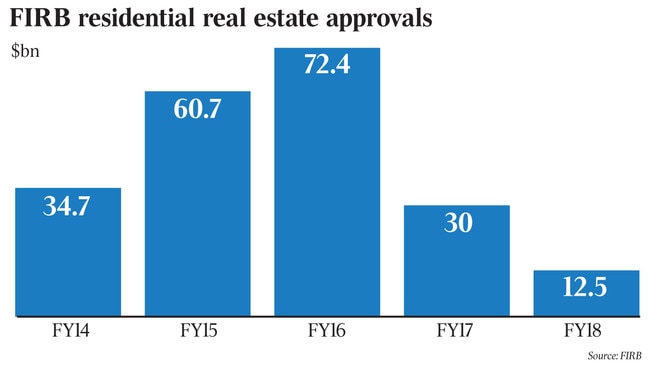FIRB report: Investment dives as China turns off taps
The US has surpassed China as the largest source country for foreign investment for the first time since 2013.

The US has surpassed China as the largest source country for foreign investment for the first time since 2013, triggered in part by Beijing turning off the investment tap as demand for Australian property stalls.
In a sign of the property slump in full swing, the value of residential real estate approvals dived nearly 60 per cent, falling to just $12.5bn in the 2018 financial year, reflecting the dramatic slowing in foreign demand for residential real estate, according to the Foreign Investment Review Board annual report released on Monday night.
Meanwhile, the US recorded an increase in approved investment from $26.5bn in financial year 2017 to $36.5bn in 2018, with significant increases in real estate and the manufacturing, electricity and gas sectors.

China was the second largest source country following a decrease in approved proposed investment to $23.7bn in 2018 from $38.9bn in 2017. This reduction was due to falls across all sectors. Chinese proposed investment peaked at $47.3bn in 2016.
“We have seen a decline in proposed investment from China as Chinese authorities have tightened capital controls, (but) foreign investor interest in Australia remains strong,” FIRB chair David Irvine wrote.
Mr Irvine, the former head of security agency ASIO, said FIRB was focusing on “ensuring that sensitive assets were thoroughly assessed across all dimensions of the national interest and providing early guidance to potential investors” where possible.
The market was rocked by last November’s rejection of Li Ka-Shing’s bid through CK Asset Holdings for the largest gas network operator in Australia, APA Group, and the FIRB report provided an insight into its frameworks.
“With respect to national security assessments within the wider national interest focus, Australia’s approach continues to evolve in recognition of the risks and threats that emerge,” Mr Irvine wrote.
He cited the introduction of the Security of Critical Infrastructure Act 2018, giving government greater visibility and oversight of critical infrastructure, as well as the Telecommunications Sector Security Reforms introduced in 2018 to provide additional protection for Australia’s telecommunications sector.
“The government further announced that diversity of ownership can be an important safeguard in the electricity sector, and conditions and ownership restrictions would be imposed on certain assets,” Mr Irvine said.
He highlighted demand for data centres was raising national interest factors given the sensitivity of the protection of data.
The FIRB reviewed a number of high profile foreign investment applications, including the acquisition of the Whyalla steelworks by British businessman Sanjeev Gupta and the acquisition of Australia’s largest diagnostic imaging provider, I-MED Radiology Network, by the European private equity firm Permira, according to data released last night.
More than 11,000 proposed transactions were approved representing potential investment of $163.1bn, in the year to end-June 2018. Buyers targeted companies in the services sector, which attracted the most approved investment, with the value of approvals in healthcare doubling as offshore groups targeted Australia’s ageing population.
Carrie Law, chief of international real estate website Juwai.com, said Chinese investment in property dropped to $12.7bn in 2017-18 from $15.3bn the year before. Despite the 17 per cent fall China still accounts for one in four dollars of foreign real estate investment.
“Chinese buying in 2017-18 was most impacted by three factors: the unexpected cancelling of promised mortgage loans by Australian banks, higher foreign stamp duty, and capital controls making it more difficult to move money from China,” she said.
Real estate was the second biggest investment sector, taking 32 per cent of all foreign investment, trailing services, which take 39 per cent.





To join the conversation, please log in. Don't have an account? Register
Join the conversation, you are commenting as Logout